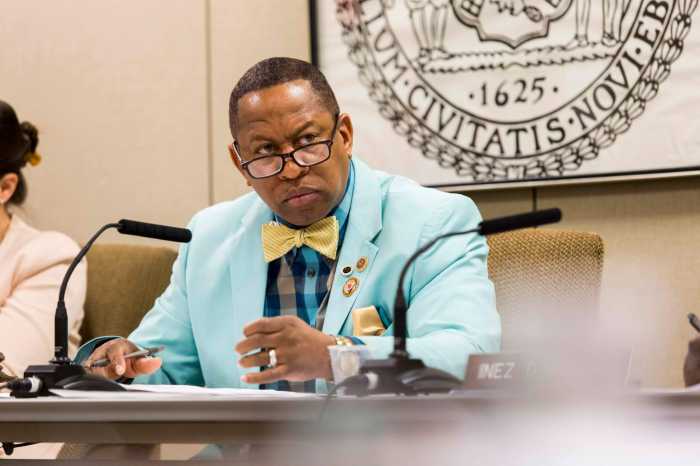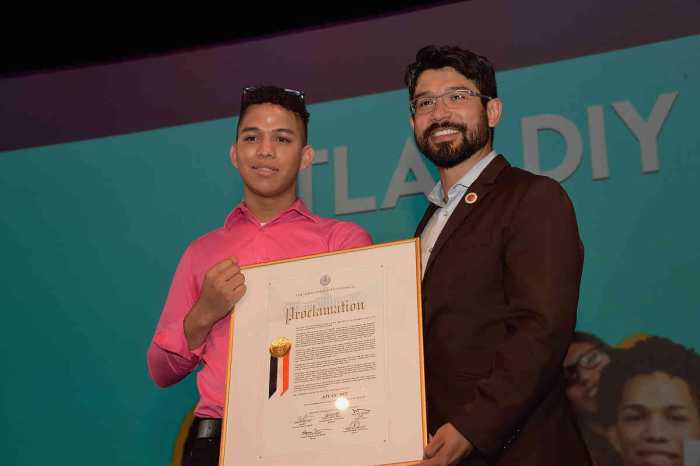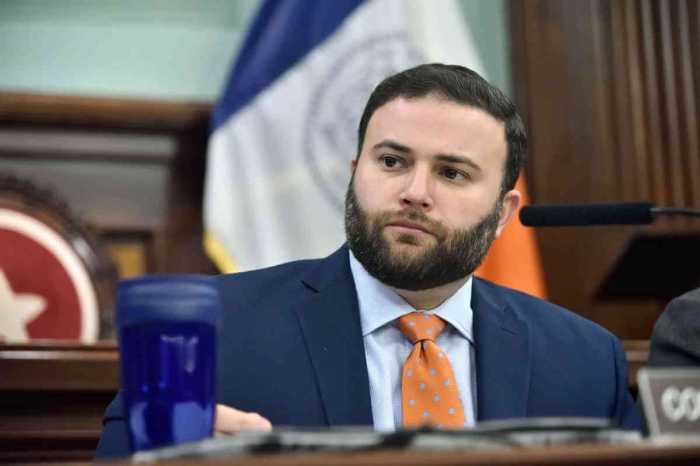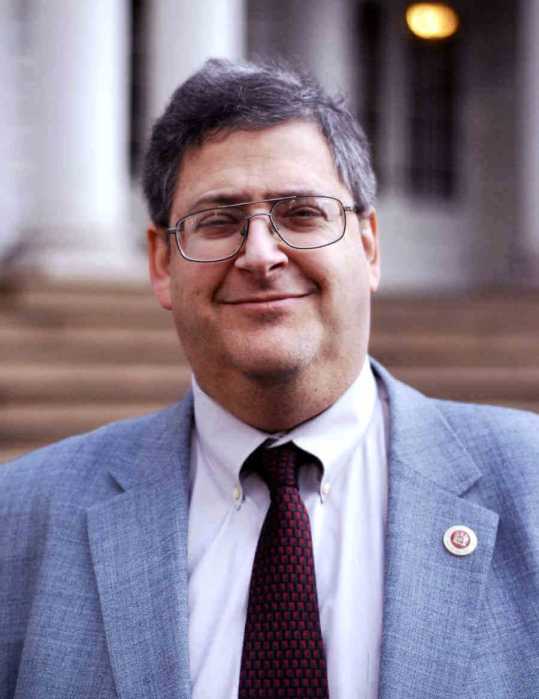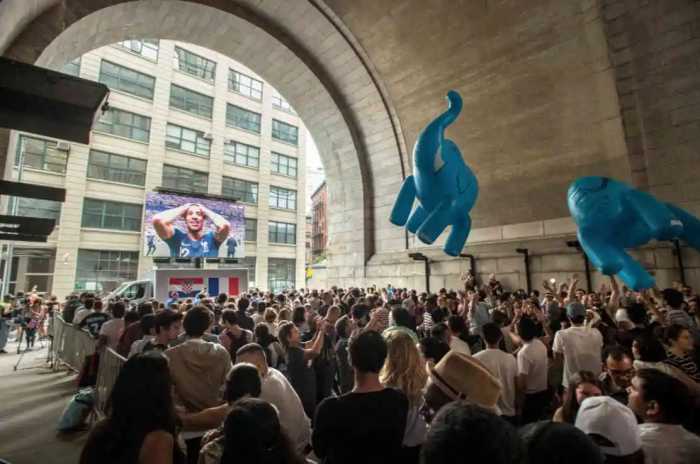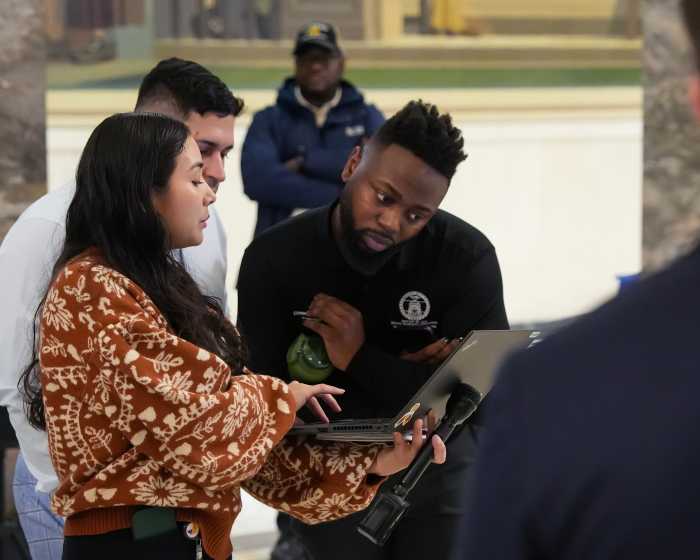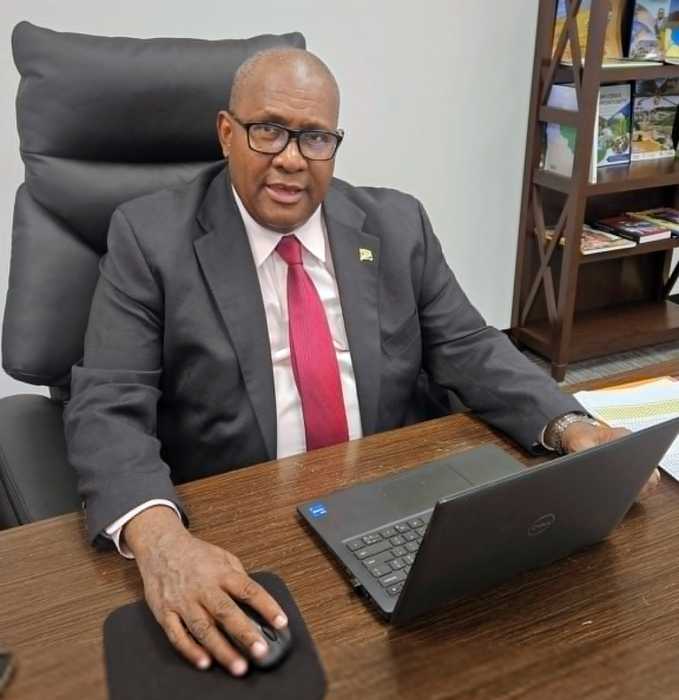The seven new out LGBTQ members of the City Council are overhauling the LGBT Caucus in historic fashion and bringing a dash of bipartisanship for the first time, but the changing of the guard also marks the end of an era that will go down in queer history.
The four departing out members of the Council paved their own paths on a number of fronts across the city — and one of them, Corey Johnson of Manhattan, climbed the ranks to become speaker. Johnson was the first individual living with HIV to lead the Council, Jimmy Van Bramer and Daniel Dromm of Queens were the first out city lawmakers in the borough, and Carlos Menchaca became the first out lawmaker in Brooklyn and the first Mexican-American lawmaker in New York City. Ritchie Torres, who ascended to Congress just months before the conclusion of his second and final term in the City Council, was the first out lawmaker in the Bronx.
Johnson became speaker in 2018, but Torres was the only one among them who rose beyond City Hall. Torres defeated his anti-LGBTQ rival, Ruben Diaz, Sr., among others, in a dramatic and crowded 2020 congressional primary campaign before walking to the finish line in the general election. Van Bramer was unsuccessful in his bid for Queens borough president, Johnson lost a primary for city comptroller after abandoning an exploratory bid for mayor, and Menchaca was one of many candidates enmeshed in the crowded mayoral race before he dropped out in the months leading up to the primary.
Torres, now 33, was 24 years old during his first campaign for City Council when he was elected at the same time as Johnson and Menchaca. Van Bramer and Dromm first took office in 2010 and were able to serve an extra term because they were grandfathered in when the city reinstated limits of two terms. The Council also briefly had seven members in 2016 and 2017 before Rosie Mendez of Manhattan and Jimmy Vacca of the Bronx concluded their tenures.
“I’m very proud to have served in what was the largest LGBTQ Caucus when we had seven members after Jimmy Vacca came out,” said Van Bramer, whose district includes Sunnyside, Woodside, Long Island City, Astoria, and Dutch Kills. “I am enormously proud of the 12 years I served in the Council.”
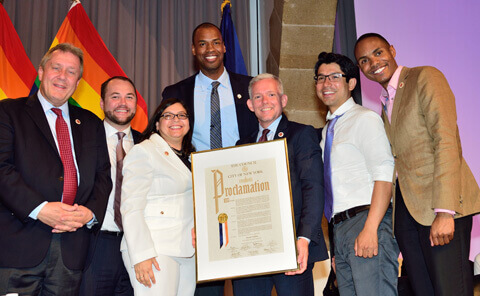
In interviews with Gay City News, Dromm, Menchaca, and Van Bramer looked back on their eventful stints in city office — which included their leadership positions during an era that encompassed the converging coronavirus pandemic and the Black Lives Matter movement of 2020. By then, many members of the LGBT Caucus had long established themselves in the City Council, which brought greater responsibility and public accountability to their roles: Dromm, as the chair of the Finance Committee, felt the weight of public pressure during budget season from activists who wanted a significant reduction in police funding, while Johnson took even more heat on those issues as the leader of the City Council.
Long before the dawn of that era, the lawmakers had to find their footing to carve out their own place in city leadership. Johnson was a gay activist and chaired Community Board 4 before he went on to prevail in a competitive City Council race against out lesbian attorney Yetta Kurland to succeed out lesbian former Speaker Christine Quinn in District 3, which includes Chelsea, Hell’s Kitchen, Greenwich Village, West SoHo, Hudson Square, Times Square, the Garment District, the Flatiron District, and the Upper West Side. Four years later, Johnson zigzagged the city to persuade colleagues from every borough and ideological background to back his bid for speaker. At the same time, he tapped into the emotions of constituents when he conveyed his personal story of growing up as a closeted gay youth who struggled with depression.
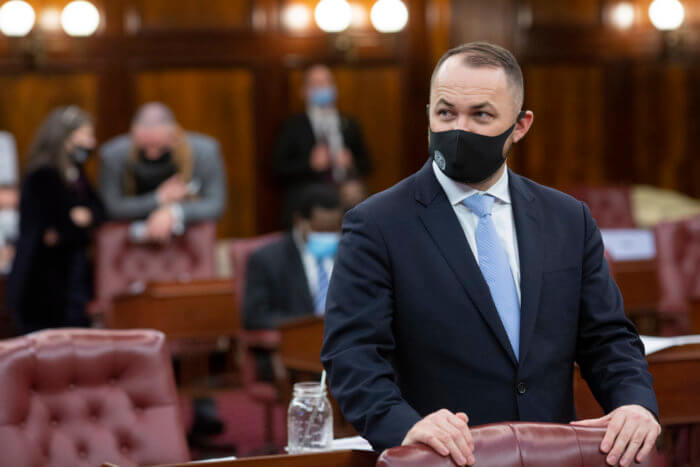
Dromm and Van Bramer both gave credit to Thomas Duane, a trailblazing former lawmaker who was one of the city’s first two out councilmembers and the first out person elected to the State Senate, as they reflected on their journeys to city office. Dromm, a former teacher who was engaged in LGBTQ activism after coming out in 1992, said he doubted his own ability to win an election in what he thought was a conservative district in Elmhurst and Jackson Heights. But Duane encouraged him to run for office.
“[Duane] said ‘No, you should definitely think about it,’ and it took me 17 years to do it and do it successfully and beat an incumbent,” said Dromm, who toppled two-term lawmaker Helen Sears by a 10-point margin in District 25 in 2009. He went on to win two more terms and was chair of the LGBT Caucus.
Like Dromm, Menchaca had doubts about his own candidacy during his first campaign in Brooklyn’s District 38, which includes Red Hook, Sunset Park, Greenwood Heights and parts of Windsor Terrace, Dyker Heights, and Boro Park. He thought his identity as an out gay Mexican-American man would have a negative impact on his ability to win there.
“What I found was it didn’t have a negative impact at all,” said Menchaca, who chaired the Council’s Committee on Immigration. “What people really appreciated was the relationship to my identity as it pertained to how I was going to govern, and I say that because I think it was very clear people saw my own life story and saw how much we had in common. That led to the fact that Sunset Park and Red Hook — not Park Slope — elected the first openly gay councilmember in Brooklyn, and it was because they could relate to my family and my experience. They saw themselves in me. They didn’t have to be Mexican. They didn’t have to be gay.”
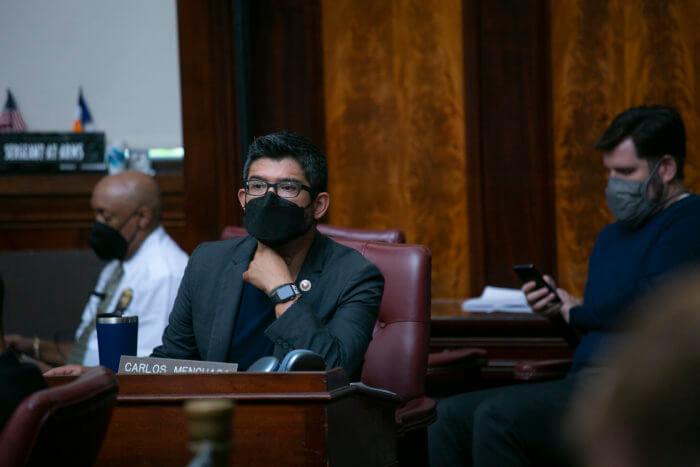
Dromm, Menchaca, and Van Bramer said they leaned on their previous experience in public service to navigate their surroundings. Van Bramer, who served as chair of the Council’s Cultural Affairs, Libraries, and International Intergroup Relations Committee, acknowledged that he developed a reputation for being “the library guy” thanks to his past work in libraries. Dromm carried his educational background to his role as chair of the Education Committee during his first term and Menchaca entered office having already worked under out former speaker Christine Quinn. That experience, Menchaca said, helped him hit the ground running once he took office.
“It was thrilling and overwhelming and just so full of possibility,” Menchaca recalled of his first days in office. “It took awhile for me to latch back onto the ground. My first day, I was like, ‘wow, you’re the first this, first that…’ but then I had to get to work. I had to build new schools for families. I had to build bike lanes. And, of course, with that experience, I knew how to do it.”
Facing the end of their terms, the City Council veterans looked back on some of what they believe were their most significant achievements — including their work pertaining to the LGBTQ community. Van Bramer said he is proud of his work to build new schools in his district and to allocate billions of dollars for culture, the arts, and libraries, and he further praised the work of the City Council to help fund the forthcoming American LGBTQ Museum in Manhattan, among other projects.
“One of the things I also personally fought for and secured was a $100,000 grant to The Center on 13th Street for their archive,” Van Bramer said. “I worked in the Queens Public Library for 11 years before I got elected and I love archives.”
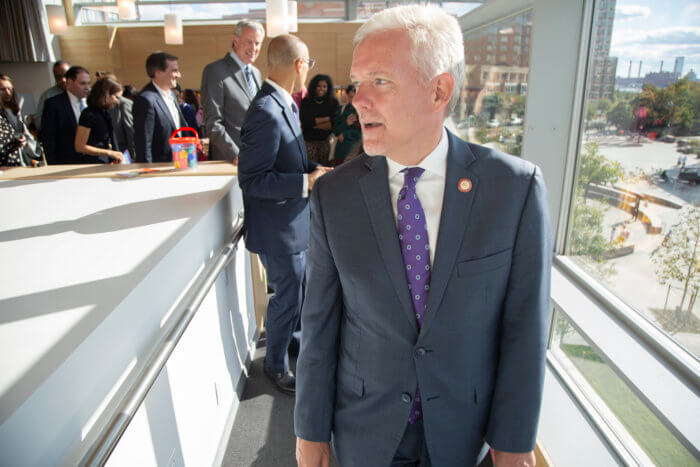
Menchaca, who notably helped lead the opposition to the Industry City rezoning, also spoke of his collaborative work alongside Torres, explaining that the two joined forces to bring funding to groups such as Services & Advocacy for GLBT Elders (SAGE) and the Hetrick-Martin Institute. Menchaca also pointed to his work in bringing psychiatric and mental health support to young people.
Among other undertakings, Torres and Johnson both steered related bills to passage in 2018 that bolstered shelter services for homeless youth, including Torres’ bill permitting shelters for homeless and runaway youth to serve young adults between the ages of 21 and 24. Torres did not respond to a request for comment for this story.
Dromm said one of his many proudest accomplishments was creating the IDNYC program, which is a city-issued identification document allowing New York residents, regardless of immigration status, to obtain city services and benefits, apply for health insurance, open a bank account, and access other benefits. Dromm also pointed to funding for the Trans Equity initiative and the establishment of the LGBTQ liaison position in the Department of Education, as well as the incorporation of LGBTQ curriculum in some schools, though he conceded that much more work is needed to integrate queer curriculum across the city.
Some of the councilmembers secured victories up until the final weeks of their terms. Dromm’s bill to create an advisory committee to review nuclear disarmament, for example, passed the Council on December 9 — more than two years after it was first introduced — and earlier in the year the Council passed his legislation providing intersex-inclusive education to doctors, parents, and guardians of intersex children. Menchaca praised the passage of a bill he co-sponsored that gave non-citizens the right to vote in municipal elections in New York City.
Not everything, though, was accomplished in time. Menchaca, who drew some criticism among progressives when he backed the mayoral campaign of Andrew Yang, said he led the Council in trying to pass a universal basic income pilot program, but never got that done. Menchaca said there were multiple immigration-related objectives that were stymied because he felt the de Blasio administration was not ready to negotiate with the Council, including his 2018 bill to ban the city from contracting with US Immigration and Customs Enforcement.
Van Bramer thought the councilmembers did everything they could while they were in office, and he acknowledged that some things — like the timeline of construction projects — were out of their control.
Dromm said his “biggest frustration” as he leaves the Council is the failure to pass legislation banning solitary confinement in New York City. Dromm’s bill to ban the practice was backed by 35 councilmembers — including the entire LGBT Caucus minus Johnson. It never got a vote.
“It’s been frustrating because the last 12 years I’ve been trying to get rid of solitary confinement,” Dromm said. “Unfortunately, the politics didn’t allow that to happen. I put the blame on [Mayor] Adams.”
In December, Adams expressed support for punitive segregation, prompting a majority of councilmembers to deliver a letter criticizing that approach. The State Legislature’s HALT Solitary Confinement Act, which banned prisons and jails from putting people in isolation for more than 15 days and barred it entirely for some populations, is set to go into effect in April.
Dromm said he hopes to see Adams follow through on “the support he’s speaking about in the LGBTQ community” and recalled when Adams delivered remarks on the State Senate floor as marriage equality was about to pass in New York State.
“I hope he recognizes the intersectionality of our cause and can help to promote LGBTQIA rights moving forward,” Dromm said. “I’m hoping he will be a strong advocate.”
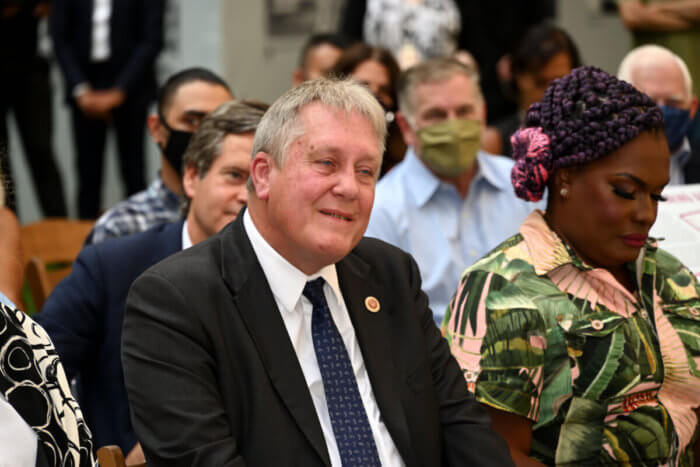
Like other elected officials, the outgoing lawmakers encountered political turbulence at various points during their time in office. During his first term, Menchaca was booted from his role as co-chair of the City Council’s Brooklyn delegation. Dromm faced protests at his home during budget season in 2020. Van Bramer was embroiled in two bruising and bitter battles with Donovan Richards in the race for Queens borough president.
Johnson, who did not respond to multiple requests for an interview for this story, saw his fair share of highs and lows during his tenure in office, which included a period during 2019 when he was labeled by some as the “de facto mayor” because he was scrambling to update New Yorkers on the status of a summertime blackout when Bill de Blasio was preoccupied with his 2020 presidential campaign.
Johnson also, however, struck a nerve with many in the LGBTQ community that same year when he voiced his opposition to full sex work decriminalization. That issue shot to the forefront of queer advocacy in 2019 — the same year that the DecrimNY coalition swept through the city. DecrimNY, Gay Men’s Health Crisis, the New York City Anti-Violence Project, VOCAL-NY, and WOMANKIND and other organizations criticized Johnson for his stance on that issue.
On the contrary, many of the incoming Democratic members of the LGBT Caucus explicitly campaigned on decriminalizing sex work — and after the passage of state-based legislation repealing the ban on Walking While Trans, there is reason to believe that those out members of the Council will serve as strong advocates for the decriminalization movement as well as other progressive causes.
Menchaca is especially excited about the two incoming LGBTQ lawmakers in his borough — Chi Ossé and Crystal Hudson — and he said they bring a “whole new set of connections to the neighborhood.” He said he would have liked to have another out councilmember in his borough during his time in office.
The other incoming members of the LGBT Caucus are Manhattan’s Erik Bottcher, who is succeeding Johnson in District 3 and served as his chief of staff for seven of his eight years in office, and Kristin Richardson Jordan of District 9; Lynn Schulman and Tiffany Cabán of Queens; and Staten Island Republican David Carr.
On their way out, the term-limited LGBT Caucus members expressed their willingness to remain active, but some also voiced a desire to take a break. They recognized that much has changed in their own lives during their time in office — and cited the taxing nature of that work.
Van Bramer and his husband Dan Hendrick got married in 2012, while Menchaca said he was in a long-term relationship when he entered the Council but is leaving the chamber as a single man.
“I say that because there is so much sacrifice in this job and it’s real,” he said. “I now hope to refocus on my personal life.”
Menchaca has “nothing to report” on his future for now, but said he is “exploring some ideas with the new administration.” He also hinted at the possibility of some role beyond the five boroughs, saying he wants “to explore my services not just to the city, but to the state.”
Dromm, meanwhile, is taking some time off and said he has a house upstate and two dogs to accompany him.
“I want to stay involved with something somehow, probably in education,” Dromm said. “The four things I focused on were criminal justice reform, LGBTQ, education, and immigration, so looking forward to the future, I still want to be involved in those issues. I’ve been given offers to be on boards and things like that, but I want to decompress and figure out how much time I can really give.”
According to the New York Post, Johnson is considering launching a government-relations consulting shop.
As for Van Bramer, something new is on the horizon — but he’s not yet ready to disclose it.
“I’m very excited about what’s coming next for me professionally and I should have an announcement about that in January — but not just yet,” he said.


